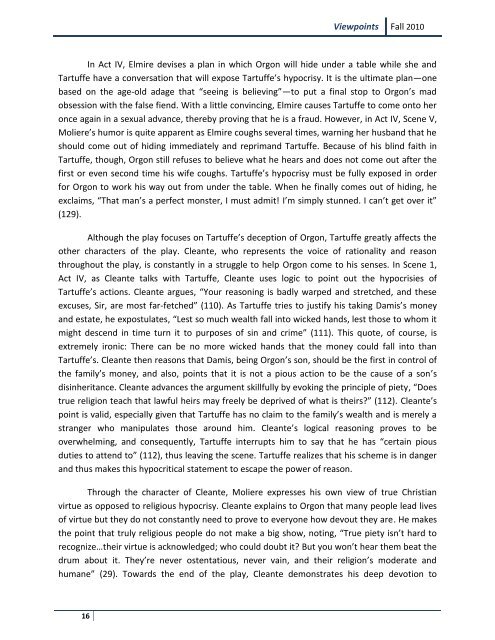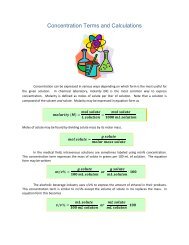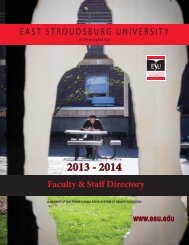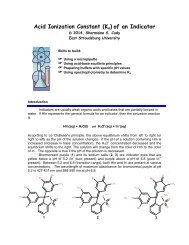Orgon's Obsession in Moliere's Tartuffe
Orgon's Obsession in Moliere's Tartuffe
Orgon's Obsession in Moliere's Tartuffe
You also want an ePaper? Increase the reach of your titles
YUMPU automatically turns print PDFs into web optimized ePapers that Google loves.
16<br />
Viewpo<strong>in</strong>ts Fall 2010<br />
In Act IV, Elmire devises a plan <strong>in</strong> which Orgon will hide under a table while she and<br />
<strong>Tartuffe</strong> have a conversation that will expose <strong>Tartuffe</strong>’s hypocrisy. It is the ultimate plan—one<br />
based on the age-old adage that “see<strong>in</strong>g is believ<strong>in</strong>g”—to put a f<strong>in</strong>al stop to Orgon’s mad<br />
obsession with the false fiend. With a little conv<strong>in</strong>c<strong>in</strong>g, Elmire causes <strong>Tartuffe</strong> to come onto her<br />
once aga<strong>in</strong> <strong>in</strong> a sexual advance, thereby prov<strong>in</strong>g that he is a fraud. However, <strong>in</strong> Act IV, Scene V,<br />
Moliere’s humor is quite apparent as Elmire coughs several times, warn<strong>in</strong>g her husband that he<br />
should come out of hid<strong>in</strong>g immediately and reprimand <strong>Tartuffe</strong>. Because of his bl<strong>in</strong>d faith <strong>in</strong><br />
<strong>Tartuffe</strong>, though, Orgon still refuses to believe what he hears and does not come out after the<br />
first or even second time his wife coughs. <strong>Tartuffe</strong>’s hypocrisy must be fully exposed <strong>in</strong> order<br />
for Orgon to work his way out from under the table. When he f<strong>in</strong>ally comes out of hid<strong>in</strong>g, he<br />
exclaims, “That man’s a perfect monster, I must admit! I’m simply stunned. I can’t get over it”<br />
(129).<br />
Although the play focuses on <strong>Tartuffe</strong>’s deception of Orgon, <strong>Tartuffe</strong> greatly affects the<br />
other characters of the play. Cleante, who represents the voice of rationality and reason<br />
throughout the play, is constantly <strong>in</strong> a struggle to help Orgon come to his senses. In Scene 1,<br />
Act IV, as Cleante talks with <strong>Tartuffe</strong>, Cleante uses logic to po<strong>in</strong>t out the hypocrisies of<br />
<strong>Tartuffe</strong>’s actions. Cleante argues, “Your reason<strong>in</strong>g is badly warped and stretched, and these<br />
excuses, Sir, are most far-fetched” (110). As <strong>Tartuffe</strong> tries to justify his tak<strong>in</strong>g Damis’s money<br />
and estate, he expostulates, “Lest so much wealth fall <strong>in</strong>to wicked hands, lest those to whom it<br />
might descend <strong>in</strong> time turn it to purposes of s<strong>in</strong> and crime” (111). This quote, of course, is<br />
extremely ironic: There can be no more wicked hands that the money could fall <strong>in</strong>to than<br />
<strong>Tartuffe</strong>’s. Cleante then reasons that Damis, be<strong>in</strong>g Orgon’s son, should be the first <strong>in</strong> control of<br />
the family’s money, and also, po<strong>in</strong>ts that it is not a pious action to be the cause of a son’s<br />
dis<strong>in</strong>heritance. Cleante advances the argument skillfully by evok<strong>in</strong>g the pr<strong>in</strong>ciple of piety, “Does<br />
true religion teach that lawful heirs may freely be deprived of what is theirs?” (112). Cleante’s<br />
po<strong>in</strong>t is valid, especially given that <strong>Tartuffe</strong> has no claim to the family’s wealth and is merely a<br />
stranger who manipulates those around him. Cleante’s logical reason<strong>in</strong>g proves to be<br />
overwhelm<strong>in</strong>g, and consequently, <strong>Tartuffe</strong> <strong>in</strong>terrupts him to say that he has “certa<strong>in</strong> pious<br />
duties to attend to” (112), thus leav<strong>in</strong>g the scene. <strong>Tartuffe</strong> realizes that his scheme is <strong>in</strong> danger<br />
and thus makes this hypocritical statement to escape the power of reason.<br />
Through the character of Cleante, Moliere expresses his own view of true Christian<br />
virtue as opposed to religious hypocrisy. Cleante expla<strong>in</strong>s to Orgon that many people lead lives<br />
of virtue but they do not constantly need to prove to everyone how devout they are. He makes<br />
the po<strong>in</strong>t that truly religious people do not make a big show, not<strong>in</strong>g, “True piety isn’t hard to<br />
recognize…their virtue is acknowledged; who could doubt it? But you won’t hear them beat the<br />
drum about it. They’re never ostentatious, never va<strong>in</strong>, and their religion’s moderate and<br />
humane” (29). Towards the end of the play, Cleante demonstrates his deep devotion to








